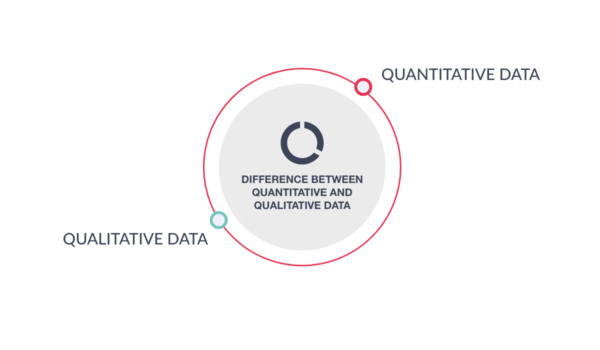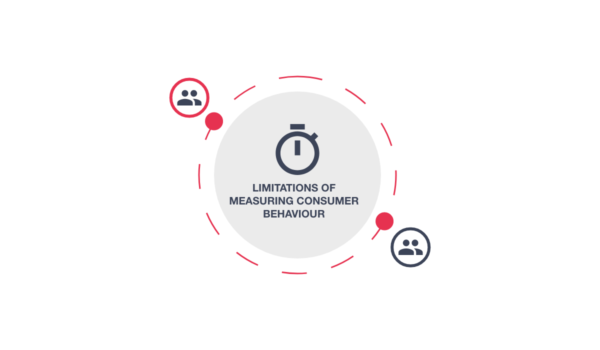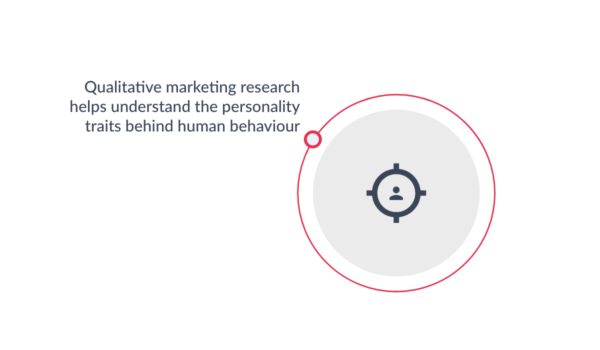What influences consumer behaviour? That’s the burning question for every business and marketing company looking to increase their sales.
Over the past decade, how we analyse consumer behaviour has been revolutionised by tools for social media listening and online behaviour analysis. But there’s a problem: these tools generally only focus on quantitative metrics, giving binary answers to try and answer a very complex and nuanced question: what causes people to make their purchasing decisions?
At Symanto, we’ve developed AI technology to help answer that question. Our tools analyse vast amounts of both quantitative and qualitative data online for you to use as marketing research to understand consumer behaviour.
The difference between quantitative and qualitative data
Quantitative data is about understanding the facts of social phenomena. It assumes a fixed and measurable reality. As a result, it doesn’t allow for nuance and is quite limited in what it can tell us about the psychology behind human behaviour.
However, most of the data collected by social listening and web analytics tools is quantitative. It tells us what they are doing, but it doesn’t explain the cause of the behaviour or the psychology of the consumer.
Qualitative data, on the other hand, can provide us with a deep insight into the perspective of consumers. It is reported through language, and as such, it is as rich and complex as the psychology of the consumers themselves.
Traditionally, collecting, researching and analysing qualitative marketing data to understand consumer behaviour has been time and resource exhaustive. But as we will explore, Symanto has developed AI technology to extract useful qualitative information from existing data online within a matter of minutes.
This qualitative data helps you to understand your consumer base far more accurately than focussing on behaviour patterns and demographic information.
The limitations of measuring consumer behaviour
We’re not here to challenge the idea that measuring consumer behaviour is useful. It is indisputably useful to be able to notice trends in purchasing behaviour, and interactions on social media. But the problem is that this data can only tell you what is happening, it doesn’t leave you with much information as to why it’s happening.
Two people with similar demographic profiles can demonstrate the same behaviours, but their reasoning can be very different, and they respond to very different messaging. For example, two men in their 30s buy a food processor. One uses it to make smoothies to boost his morning workout, the other buys it to make quick mid-week meals for his family.
Will these two men make the same purchasing decisions moving forward? Unlikely, and yet this is the assumption we are likely to make if we try and predict consumer tendencies based solely on demographic profiles and past behaviours.
Symanto analyses qualitative marketing research to understand the personality traits behind human behaviour
At Symanto, our focus is on understanding who your customers are and through that information, we can more accurately predict why they do what they do. In other words, whereas most social listening tools work backwards from the end result (behaviour) to try and predict who your customer is (their psychological traits), we start at the source by studying what people say.
Our text analytics technology mines vast quantities of unstructured open-ended answers (the information that really helps us understand people) for useful insights, and extracts information such as the personality traits of the people behind the data.
Our psycholinguistic AI technology has learned to recognise and analyse patterns in language and associate how people use language with key personality traits.
Understanding personality traits
Personality traits are generally described as continuous patterns of behaviour, emotion, and thought.[1] Various approaches, from behavioural to psychoanalysis, have been utilized to generate a deeper understanding of personality and human development.
One of the popular theories is the Big Five personality traits theory which revolves around five factors:
● Openness to experience,
● Conscientiousness,
● Extraversion,
● Agreeableness
● Neuroticism.[2]
A relatively similar approach is the Myers-Briggs Type Indicator (MBTI), developed by the mother and daughter duo Katherine Cook Briggs and Isabel Myers.[3] Their work further developed the typological theory proposed by Carl Jung, which stipulated that there are four main psychological functions, namely sensation, intuition, feeling and thinking, with one of these playing a dominant role for an individual most of the time.[4] It is this approach that Symanto’s technology is based on.
How can this information be applied to help companies?
Understanding personality traits helps to inform companies in two main ways:
1. How their consumers make decisions:
For instance, does the consumer make decisions in an impersonal way using logical reasoning, or do they base their decisions on personal values and how their actions affect others around them?
2. How their consumers prefer to take in information:
For example, does the consumer respond better to pragmatic information described in a literal way, or are they open-minded optimists who enjoy imagining scenarios and enjoy figurative and poetic language?
These two key aspects provide crucial insights for companies to enable them to better understand their consumers’ decision-making processes and furthermore inspire them to take an action.
Another significant advantage of uncovering the personality traits of consumers is that they are stable across time in contrast to behaviour.5 While our actions and choices vary considerably over time, our personality traits remain fairly constant.
Get better insights with Symanto
When it comes to analysing qualitative marketing research to understand consumer behaviour, Symanto’s suite of products can be used to extract meaningful insights such as the personality traits of your consumers. With this information you can make better decisions to drive the efficiency of your messaging and forge stronger relationships with existing customers.
Get in touch to find out how Symanto can develop a personal insights platform for your business needs.
[1] Kassin, S. M. (2003). “Psychology”. Prentice Hall, Inc.
[2] Matthews, G. et al. (2003). “Personality Traits (2nd ed.). Cambridge University Press.
[3] Myers, I. B.; Myers, P. B. (1995). “Gifts differing: understanding personality type”. Davies-Black Pub.
[4] Kaplan, R.M.; Saccuzzo, D. P. (2008). “Psychological Testing: Principles, Applications and Issues (7th ed.). Thomson Learning EMEA, Limited.
[5] Matthews, G. et al. (2009). “Personality Traits (3rd ed.). Cambridge University Press. Pg. 447
Businesses and marketing teams, in particular, use qualitative market research to understand their market and customers’ needs and identify ways to improve their products.
What Is Qualitative Research in Marketing?
Qualitative marketing research is a powerful instrument and exploratory approach that provides meaningful details regarding the consumers’ motivations, preferences and behaviours.
Its purpose is to discover the “why” behind customer buying decisions by studying non-numerical data like language, experiences, images, etc. And deliver valuable details and insights into the intricacies of consumer perceptions and views.
Why is qualitative research important in marketing?
Qualitative research has a fundamental contribution in depicting the complexities of the consumers’ behaviour and human psychology.
Using a qualitative lens, research can go beyond numbers, surface information, and insights that quantitive research cannot identify. It allows marketers to put themselves in their customers’ shoes, truly understand their desires and craft tailored strategies.
One of the main advantages of qualitative research is highlighting psychological and emotional elements of customer decision-making. These insights allow businesses to personalise their offering and messaging.
What Is the Difference Between Qualitative and Quantitative Marketing Research?
Marketing research is executed via two approaches: qualitative and quantitative. They fundamentally differ regarding their goals, methods and what they seek.
Qualitative marketing search
It aims to uncover the core of consumer decisions and resumes to in-depth insights and exploration.
The main characteristics of qualitative research are:
- Accent on quality. It focuses on smaller groups but digs more into details like experiences, thoughts, feelings, etc. The primary purpose is to obtain insights.
- Context exploration. Qualitative research evaluates the context of behaviours. And pays attention to the psychological, social and environmental factors influencing buying decisions.
- Answers the “Why”. Understanding the motives behind consumer behaviours, decisions, and preferences is paramount for businesses. That’s why they use qualitative research to discover what factors drive consumer actions.
- Open-ended questions. Encouraging customers to answer freely to the research questions leads to getting detailed and meaningful responses.
- Methods. Qualitative marketing research employs methods like focus groups, observation, ethnographic studies, interviews, etc. The scope is to delve into unstructured conversations and extract nuanced insights.
Quantitative research
It deals with collecting vast amounts of structured data from large samples. And has as main characteristics:
- Accent on quantity. Quantitative research means surveying numerous participants with closed-ended questions. It’s all about statistical patterns and numerical data.
- Patterns and trends. Such a methodology is great for determining trends, patterns and correlations within large amounts of data. And gets the answer to questions like what’s happening and how often.
- Objective results. It concentrates on measurable and objective data and is a good fit for obtaining general conclusions or testing options.
- Extrapolation. Quantitative research is used to make generalisations and uses a representative sample to outline the characteristics of a large group of consumers.
- Methods. Standard methods for quantitative research are structured questionnaires and surveys. Their common features are replicability and consistency.
Quantitative vs qualitative data

Quantitative data is about understanding the facts of social phenomena. It assumes a fixed and measurable reality. As a result, it doesn’t allow for nuance and is quite limited in what it can tell about the psychology behind human behaviour.
However, most of the data collected by social listening and web analytics tools is quantitative. It tells us what they are doing, but it doesn’t explain the cause of the behaviour or the psychology of the consumer.
Qualitative data, on the other hand, can provide you with deep insights into the perspective of consumers. It is reported through language, and as such, it is as rich and complex as the consumers’ psychology.
Collecting, researching and analysing qualitative marketing data to understand consumer behaviour has traditionally been time and resource-exhaustive.
However, companies like Symanto have developed AI technology to extract useful qualitative information from existing data online within a matter of minutes.
This qualitative data helps you understand your consumer base far more accurately than focussing on behaviour patterns and demographic information.
Qualitative Research Methods
These methods allow businesses to pick the minds of their target consumers and surface the beliefs, motivations and emotions that influence buying behaviours and decisions.
The most used methods for qualitative marketing research are:
Focus Groups
Focus groups are organised discussions on an established topic with a small group of persons selected based on clearly defined criteria. During these conversations, usually moderated by the organiser, participants share their experiences, opinions, expectations and thoughts.
Advantages of focus groups:
- Variety of perspectives. Participants interact and share their point of view.
- Real-time feedback. Researchers obtain answers to their questions right away and explore further the topics of interest.
- Plentiful insights. Focus groups are a valuable source of qualitative data, as participants express their opinions freely.
Focus groups also have disadvantages: they have high costs and are time-consuming.
And are usually used when launching new products and new features of existing products. In such cases, the target audience input is absolutely necessary.
Interviews
In-depth interviews are one-on-one conversations between a researcher and a relevant participant. During the interview, the participant’s points of view, experiences, opinions and preferences are discussed in detail.
They may be unstructured, structured or semi-structured. But usually, they offer the participant the liberty to express his opinions on a specific product or promotional campaign.
Interviews are valuable tools for qualitative marketing research because they allow:
- Customisation. They can be personalised based on the participant’s experiences and background.
- Personal connection. It is an individual format and it encourages participants to speak about their unique perspectives and thoughts.
- Dig into details. Researchers have the possibility to ask detailed questions and explore complex issues.
Ethnographic Studies
Ethnographic studies are different from the previous methods because they imply the observation of the participants in their natural environment. Namely, the researcher will be a silent observer and note what the participant does, not what he claims he does.
Such a study means that the researcher will be present to watch the participant preparing dinner, shopping, meeting with friends or working.
Ethnographic studies are interesting because they provide:
- A holistic understanding. Ethnography offers a panoramic overview of the participant’s life, environment, and circumstances, including daily routines and cultural nuances.
- Details of unconscious behaviour. This method has the capacity to point out the participant’s actions and the context in which they appear, even if sometimes he might not be able to express what he does and why.
- Real context. Researchers can better understand the consumer and his behaviours in his environment.
Observation
This method doesn’t involve a direct interaction between the participant in the qualitative marketing research and the researcher. It’s somewhat like being a fly on the wall. Researchers will observe and document the participants’ behaviour, interactions, and activities.
Observation is handy if researchers want to understand how consumers behave in certain situations like navigating a website, shopping in a store, why they stopped to enter a shop, which path they choose after entering the shop, etc.
Advantages of the observation research method:
- Pain point identification. It’s a great way of spotting challenges and pain points that users experience with a product/service.
- Non-intrusive. Since the researcher’s presence is not noticed, the participants act honestly without external influence.
- Contextual insights. Observation has the possibility to reveal details related to the context provided by the real-life environment. Elements that other research approaches cannot capture.
The Limitations of Measuring Consumer Behaviour

Unquestionably, noticing trends in purchasing behaviour and interactions on social media is helpful. But the problem is that this data can only tell you what is happening. It doesn’t offer you much information about why it’s happening.
Two people with similar demographic profiles can show the same behaviours, but their reasoning and motives can differ, and they may respond differently to various messages.
For example, two men in their 30s buy a food processor. One uses it to make smoothies to boost his morning workout; the other buys it to make quick mid-week meals for his family.
Will these two men make the same purchasing decisions moving forward? Unlikely. And yet, this is the assumption we are likely to make if we try to predict consumer tendencies based solely on demographic profiles and past behaviours.
Symanto Analyses Qualitative Marketing Research to Understand the Personality Traits Behind Human Behaviour

At Symanto, we focus on understanding who your customers are; through that information, we can predict more accurately why they do what they do.
In other words, whereas most social listening tools work backwards from the end result (behaviour) to try and predict who your customer is (their psychological traits), we start at the source by studying what people say.
Our text analytics technology mines vast quantities of unstructured, open-ended answers (the information that really helps us understand people) for valuable insights and extracts information such as the personality traits of the people behind the data.
Symanto’s psycholinguistic AI technology has learned to recognise and analyse patterns in language and associate how people use language with key personality traits.
Understanding personality traits
Personality traits are generally described as continuous patterns of behaviour, emotion, and thought.[1] Various approaches, from behavioural to psychoanalysis, have been utilised to generate a deeper understanding of personality and human development.
One of the popular theories is the Big Five personality traits theory, which revolves around five factors:
- Openness to experience.
- Conscientiousness.
- Extraversion.
- Agreeableness.
- Neuroticism.[2]
The Myers-Briggs Type Indicator (MBTI) is a relatively similar approach developed by the mother-and-daughter duo Katherine Cook Briggs and Isabel Myers.[3]
Their work further developed the typological theory proposed by Carl Jung, which stipulated there are four principal psychological functions, namely sensation, intuition, feeling and thinking, with one of these playing a dominant role for an individual most of the time.[4]
It is this approach that Symanto’s technology is based on.
How can this information be applied to help companies?
Understanding personality traits helps to inform companies in two main ways:
- How their consumers make decisions:
For instance, does the consumer make decisions in an impersonal way using logical reasoning, or do they base their decisions on personal values and how their actions affect others around them?
- How their consumers prefer to take in information:
For example, does the consumer respond better to pragmatic information described literally, or are they open-minded optimists who enjoy imagining scenarios and figurative and poetic language?
These two key aspects provide crucial insights for companies and enable them to better understand their consumers’ decision-making processes and, furthermore, inspire them to take action.
Another significant advantage of uncovering consumers’ personality traits is that they are stable across time in contrast to behaviour.[5] While our actions and choices vary considerably over time, our personality traits remain reasonably constant.
Get Better Insights with Symanto
When it comes to analysing qualitative marketing research to understand consumer behaviour, Symanto’s suite of products can be used to extract meaningful insights such as the personality traits of your consumers.
With this information, you can make better decisions to drive the efficiency of your messaging and forge stronger relationships with existing customers.
Get in touch to learn how Symanto can provide a personal insights venue for your business needs.
How to Conduct Qualitative Marketing Research?
Conducting qualitative research involves several steps, as outlined below:
Clearly define the objectives and the questions of the research
It’s vital to decide what you need to find out or achieve via the research you will do. Establish objectives that are measurable, specific and aligned with your marketing strategy.
Select just the questions that are important for your business and prioritise what matters most for your objectives. Choose open-ended questions to encourage participants to share their experiences, opinions and thoughts. Try to avoid creating questions that may get biased answers.
Carefully select the participants for your research
Your qualitative marketing research results depend heavily on participants’ quality and representativeness.
Identify individuals who are your target audience, are interested in taking part in the research and engage.
Data collection techniques
Open-ended questions. In order to obtain detailed responses and disclose the “why” behind consumers’ behaviours and buying decisions, you should formulate questions in such a way as to encourage participants to share their impressions and experiences.
Probing. Moderators should ask follow-up questions to detail participants’ responses to discover hidden motivations, surface contradictions, and identify valuable insights.
Projective techniques. They are used to delve into consumers’ unconscious feelings, desires, and thoughts. Such techniques provide participants with ambiguous stimuli like images or various scenarios and invite them to answer.
Data analysis and interpretation
The core pillar of qualitative marketing research is the analysis and interpretation of collected data. It’s the process that takes raw data and transforms it into valuable insights.
First, all discussions are transcribed, and documentation is gathered and reviewed for accuracy. Next, all the data is processed and analysed via thematic analysis. The primary purpose is to identify patterns and recurring themes.
Once the themes are in place, the subsequent phase needs to establish the connections within the data. Researchers identify trends, similarities, and discrepancies that help unearth consumer pain points, needs, attitudes, etc.
In a word, actionable insights that help shape product development and tailor marketing strategies and messages.
For a long period of time, qualitative marketing research was executed manually, a time-consuming and laborious activity. But today, advanced AI technology helps automate such tasks and turn text into unique insights.
One such tool is Symanto Brain:
Symanto Brain is a powerful AI-backed solution that supports 50+ languages and is trained on billions of data sequences. And enables you to create custom AI text analytics models right away.
Get ready to learn more about the people behind comments, social posts, and other texts (like those obtained in qualitative research). And quickly surface insights from emotions, psychographics, intents, customer journey details, etc.
Findings presentation and reporting
Usually, quantitative marketing research ends with comprehensive reports handed to decision-makers and lists all the findings, their implications and recommendations.
Such reports should have an organised structure, following a logical flow and providing context, results and their interpretation. Also, it should include graphics and charts to ease the interpretation.
Qualitative Marketing Research Advantages
- Detailed insights. Qualitative research offers access to hidden insights and reveals beliefs, motivations, emotions and intricacies of buying behaviours.
- Access real-world data. It offers concrete data directly from customers, with their own stories, words and experiences.
- Understanding the exact context. Via qualitative research, businesses can understand consumer experiences in their context. And depict nuances and cultural factors that impact decisions.
- Extended flexibility. Qualitative methods are adaptable and offer the possibility to explore a large variety of topics and adjust on the go during the study.
- Leads product development. It’s a significant tool for testing new products and features, providing real-life feedback and the target audience’s opinion on products’ strengths and weaknesses.
Qualitative Marketing Research Disadvantages
- Time consuming. Usually, qualitative research is lengthy and needs time, as it involves a lot of manual labour and field activities. Plus, data analysis and interpretation.
- Costly. Qualitative research involves high costs as it requires skilled researchers, moderators, and various services and tools for analysis. Moreover, to convince participants to take part in such studies, you need to incentivise them.
- Limited extrapolation. Because it uses small samples, generalising the findings to larger populations is problematic.
- High potential for subjectivity and bias. Research bias may impact data analysis. Maintaining objectivity is sometimes tricky and requires rules and training.
- Quantifying findings may be complex. Comparing changes in qualitative aspects in time can be challenging, as they are hard to measure and quantify.
Conclusion
Qualitative research is responsible for uncovering details and insights that escape quantitative research.
But, executing it needs careful consideration of research objectives, available resources and time restrictions. Combining quantitative and qualitative marketing research with AI tools is often the best option to understand your audience better.
[1] Kassin, S. M. (2003). “Psychology”. Prentice Hall, Inc.
[2] Matthews, G. et al. (2003). “Personality Traits (2nd ed.). Cambridge University Press.
[3] Myers, I. B.; Myers, P. B. (1995). “Gifts differing: understanding personality type”. Davies-Black Pub.
[4] Kaplan, R.M.; Saccuzzo, D. P. (2008). “Psychological Testing: Principles, Applications and Issues (7th ed.). Thomson Learning EMEA, Limited.
[5] Matthews, G. et al. (2009). “Personality Traits (3rd ed.). Cambridge University Press. Pg. 447

